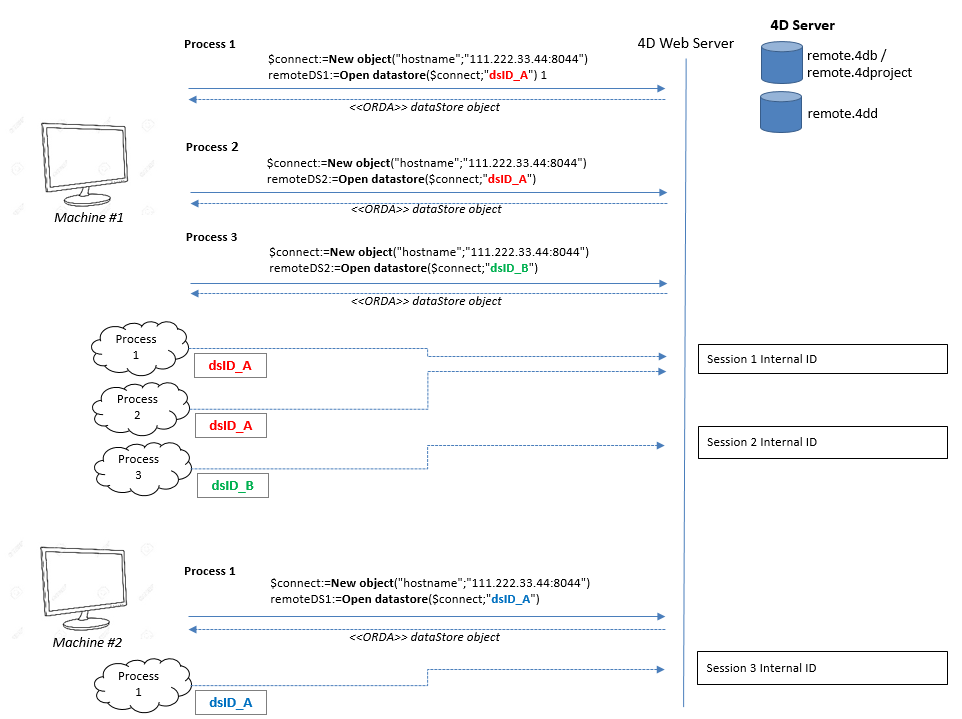Datastores distants
Un datastore distant est une référence, dans une application 4D locale (4D ou 4D Server), à un datastore stocké dans une autre application 4D.
L'application 4D locale se connecte et référence le datastore distant à l'aide de la commande Open datastore.
Sur la machine distante, 4D ouvre une session pour gérer les requêtes de l'application qui a appelé Open datastore. Les requêtes utilisent en interne l'API REST, ce qui signifie qu'elles peuvent avoir besoin de licences disponibles.
Utiliser des sessions web
Lorsque vous travaillez avec un datastore distant référencé par des appels à la commande Open datastore, la connexion avec les process de requête est gérée via des sessions web sur la machine distante.
La session web créée sur le datastore distant est identifiée à l'aide d'un ID de session interne, associé au localID du côté de l'application 4D. Cette session gère automatiquement l'accès aux données, aux entity selections et aux entités.
Le localID est local à la machine qui se connecte au datastore distant, ce qui signifie que :
- Si d'autres process de la même application doivent accéder au même datastore distant, ils peuvent utiliser le même
localIDet partager alors la même session. - Si un autre process de la même application ouvre le même datastore distant, mais avec un autre
localID, il créera une nouvelle session sur le datastore distant. - Si un autre poste se connecte au même datastore distant avec le même
localID, il créera une autre session avec un autre cookie.
Ces principes sont illustrés dans les graphiques suivants :

Visualiser les sessions
Les process qui gèrent les sessions d'accès aux datastore apparaissent dans la fenêtre d'administration de 4D Server :
- nom : "REST Handler : <nom du process>"
- type : type Worker Server HTTP
- session : le nom de session est le nom d'utilisateur passé à la commande
Open datastore.
Dans l'exemple suivant, deux process sont en cours d'exécution pour la même session :

Fermeture des sessions
Comme décrit dans le paragraphe durée de vie de la session, une session web est automatiquement fermée par 4D lorsqu'il n'y a pas eu d'activité pendant une durée déterminée par son timeout. Le timeout par défaut est de 60 mn mais cette valeur peut être paramétrée à l'aide du paramètre connectionInfo de la commande Open datastore.
Si une demande est envoyée au datastore distant après la fermeture de la session, elle est automatiquement recréée si possible (licence disponible, serveur non arrêté, etc.). Cependant, gardez à l'esprit que le contexte de la session concernant les verrous et les transactions est perdu (voir ci-dessous).
Verrouillage et transactions
Les fonctionnalités ORDA relatives au verrouillage d'entité et aux transactions sont gérées au niveau du process dans les datastore distants, tout comme en mode client/serveur ORDA :
- Si un process verrouille une entité à partir d'un datastore distant, l'entité est verrouillée pour tous les autres process, même lorsque ces process partagent la même session (voir Verrouillage d'entités). Si plusieurs entités pointant vers le même enregistrement ont été verrouillées dans un process, elles doivent toutes être déverrouillées dans le process pour supprimer le verrou. Si un verrou a été mis sur une entité, il est supprimé lorsqu'il n'existe plus de référence à cette entité en mémoire.
- Les transactions peuvent être lancées, validées ou annulées séparément sur chaque datastore distant à l'aide des méthodes
dataStore.startTransaction( ),dataStore.cancelTransaction( ), etdataStore.validateTransaction( ). Elles n’ont pas d’incidences sur les autres datastore. - Les commandes classiques du langage 4D (
START TRANSACTION,VALIDATE TRANSACTION,CANCEL TRANSACTION) ne s'appliquent qu'au datastore principal (renvoyé pards). Si une entité d'un datastore distant est verrouillée par une transaction dans un process, les autres process ne peuvent pas la mettre à jour, même si ces process partagent la même session. - Les verrous sur les entités sont supprimés et les transactions sont annulées :
- lorsque le process est tué.
- quand la session est fermée sur le serveur
- lorsque la session est arrêtée à partir de la fenêtre d’administration du serveur.